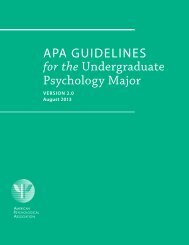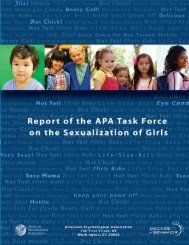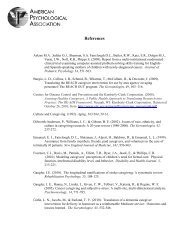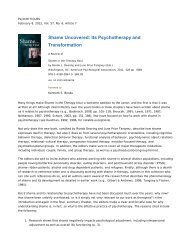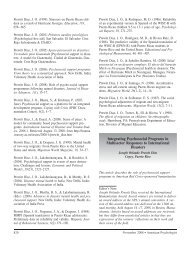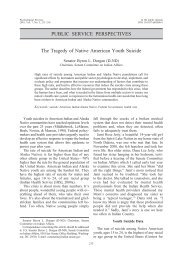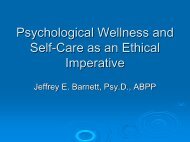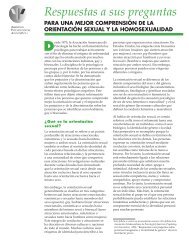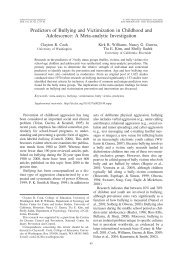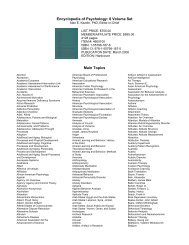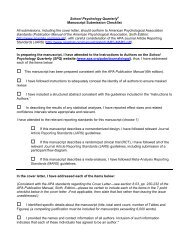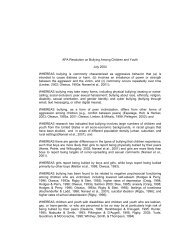James McKeen Cattell, Nicholas Murray Butler, and Academic ...
James McKeen Cattell, Nicholas Murray Butler, and Academic ...
James McKeen Cattell, Nicholas Murray Butler, and Academic ...
Create successful ePaper yourself
Turn your PDF publications into a flip-book with our unique Google optimized e-Paper software.
102 SOKAL<br />
faced those at Columbia who wished to defend academic freedom, <strong>and</strong> he closed<br />
his typed letter with a h<strong>and</strong>written postscript, “Can I do anything?”<br />
Seligman presented (<strong>and</strong> others responded to) the creation of the Committee<br />
of Nine as triumph for faculty interests. No wonder Woodbridge replied to the<br />
news with “elation” <strong>and</strong> praise for “how splendidly [Seligman had] managed the<br />
whole affair.” 147 <strong>Cattell</strong>, however, found serious fault with the Committee. Most<br />
of its members were Deans, <strong>and</strong> <strong>Cattell</strong> argued that, as one of them, Seligman<br />
should not chair it. Indeed, he charged that “as a man of independent means <strong>and</strong><br />
wide influence [Seligman did] not in equal measure feel the danger of subservience<br />
through the suppression of freedom of speech <strong>and</strong> freedom of action within<br />
the university.” 148 This attack on his defender further angered others. Woodbridge,<br />
for example, called it “not only meanly unjust” but also “an illustration of<br />
his ungenerous <strong>and</strong> irrational mind.” 149 To be sure, he admitted that <strong>Cattell</strong> was<br />
probably not “disingenuous.” However, he praised Columbia for supporting “real<br />
freedom of thought <strong>and</strong> expression” <strong>and</strong> complained that “<strong>Cattell</strong> has done<br />
nothing to promote” this reputation, but instead had “done much to destroy it.” In<br />
his view, then, “for many years [<strong>Cattell</strong>] has injured the University,” <strong>and</strong> he<br />
repeated that he would like to see <strong>Cattell</strong> retired. He still admitted that, if the<br />
trustees took “summary action” against <strong>Cattell</strong> “our position [in support of<br />
academic freedom] will be weakened.” He again concluded that “I do not see how<br />
we can make a good case” for <strong>Cattell</strong> before the trustees. Dewey <strong>and</strong> others at<br />
Columbia also took <strong>Cattell</strong> to task for criticizing Seligman as he had, <strong>and</strong> warned<br />
him against “say[ing] anything which gives people a h<strong>and</strong>le against you.” 150 But<br />
again, this was the kind of warning <strong>Cattell</strong> never took seriously.<br />
As the Committee of Nine examined “the conditions of education . . . in the<br />
university,” it reviewed <strong>Cattell</strong>’s “scientific st<strong>and</strong>ing,” <strong>and</strong> even asked if he spent<br />
enough time on campus to be considered a full-time faculty member. 151 Formal<br />
reports from Woodworth <strong>and</strong> Thorndike (for the Department of Psychology)<br />
testified that <strong>Cattell</strong> did devote appropriate attention to his professorship <strong>and</strong><br />
proved especially positive, as did a statement signed by members (including many<br />
of <strong>Cattell</strong>’s critics) of the Faculty of Pure Science. 152 Nevertheless, months before<br />
<strong>Cattell</strong> took the actions that others have long claimed led to his dismissal, the<br />
Committee formally considered resolutions calling for <strong>Cattell</strong>’s retirement. Indeed,<br />
only the intercession Dewey—who as a Committee member asked if<br />
“scholars should be retired because of eccentricities”—prevented a vote before<br />
<strong>Cattell</strong> had a chance to defend himself. 153 The next day a self-described “cold<br />
blooded” letter from Dewey told <strong>Cattell</strong> that if he did not apologize for his<br />
“invidious personal reference to the President” he would be dismissed. 154<br />
<strong>Cattell</strong> did express regret at having written his letter <strong>and</strong> signed a twosentence<br />
a letter of apology prepared by Seligman that the Committee accepted.<br />
(He later reported, with much hyperbole, that “Seligman was much moved” when<br />
he signed the apology, <strong>and</strong> that he thanked <strong>Cattell</strong> “again <strong>and</strong> again with tears in<br />
his voice, <strong>and</strong> held my h<strong>and</strong> as long <strong>and</strong> as close as if I had been his sweetheart.”)<br />
155 An original draft report called for the letter to be sent to those who<br />
received <strong>Cattell</strong>’s original “Confidential Memor<strong>and</strong>um” on the Faculty Club <strong>and</strong><br />
forwarded to the trustees “for such use as [they] deem wise.” Apparently at<br />
<strong>Cattell</strong>’s request, however, Dewey moved a “gentlemen’s agreement” for the<br />
removal of these stipulations, to which the Committee apparently agreed, though



